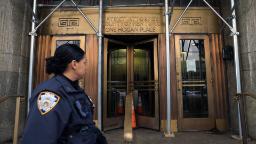[ad_1]

CNN
—
Former President Donald Trump’s expected court appearance in New York on Tuesday has led to a modest outburst of online threats featuring calls for violence but US officials say the chatter has been disorganized, sporadic and lacks the coherent planning that defined the lead-up to the January 6, 2021, attack on the US Capitol.
Any signs of a spike in violent rhetoric or evolving potential threats are filtered through federal channels at the Department of Homeland Security and FBI, which are in regular contact with the New York Police Department as it makes security preparations for Trump’s arraignment in a Manhattan courthouse, a senior US official familiar with the planning told CNN.
“We’re definitely not ruling anything out and staying vigilant,” the official told CNN. “But we don’t see any active specific, credible plotting.”
Still, current and former US national security and law enforcement officials interviewed by CNN are wary that far-right extremists are now more likely to use encrypted communications to plan their next move, rather than public message boards. These officials don’t want to make the mistake of underestimating the potential for political violence, as critics accused federal and state and local law enforcement of doing prior to January 6.
“The really sophisticated actors wouldn’t likely be talking in public forums anyway,” the senior official said.
Trump initially called for protests when he first posted about his potential arrest two weeks ago, but he hasn’t called specifically for supporters to come to New York on Tuesday since it was confirmed that he would be indicted.
The New York Young Republican Club is organizing a demonstration near the court on Tuesday. A previous protest by the group in the area was poorly attended. Rep. Marjorie Taylor Greene, a Georgia Republican, says she will attend the protest and is calling on her supporters to join.
Over the weekend, there were a handful of demonstrations by Trump supporters protesting the indictment in places including South Carolina and California. A 33-year-old man was arrested after a fight broke out on Saturday during a protest by a small group of Trump supporters in Huntington Beach, California.
Publicly, there has been a steady stream of violent rhetoric surrounding the arraignment with some focus on Manhattan District Attorney Alvin Bragg. One user on a pro-Trump forum reacting to Bragg’s push to indict Trump: “There once was a time when he would have been lynched for much less.”
Despite this, there seems to be little public discussion about actually attending the event. And a constant theme on pro-Trump message boards in recent weeks has been a fear that any protests may be a trap set by federal agents.
“Remember what happened last time Trump called for a protest? He threw everyone under the bus,” reads a post shared on a Telegram channel of the far-right Proud Boys group.
FBI and Department of Homeland Security officials have tried to strike a balance between staying vigilant for any emerging threats while also not making too much of online chatter and sharing false alarms with state and local officials. Federal agencies are also wary of opening themselves to political attacks from Republicans eager to call out anything perceived as infringing on people’s First Amendment rights, CNN has reported.
At the federal level, there is still a concern that information about potential threats the feds disseminate to state and local officials could be seen as fodder for conspiracy theorists that the government is plotting something against them, a source familiar with the planning told CNN.
Researchers, too, must balance keeping close track of inflammatory online chatter and not overplaying empty threats that would only add to public anxiety around Trump’s arraignment.
This is in stark contrast to the days leading up to January 6, when Trump supporters discussed traveling to Washington, DC, after Trump called them to the city.
On pro-Trump forums there are fears that demonstrations may be a “set-up.” This is fueled in part by the false notion that many Trump supporters believe that the January 6 attack on the US Capitol was an “inside job” or the work of far left groups like “Antifa.” In reality, hundreds of Trump supporters have been charged for taking part in the attack on the Capitol.
“Unlike January 6, we are not seeing widespread discussions about logistical preparations for protests,” Adi Cohen, the chief operating officer of Memetica, an online threat intelligence company, told CNN on Sunday.
“Instead, MAGA influencers are trying to use this incident to mobilize Trump supporters to become increasingly engaged with the campaign in the long term, particularly as the 2024 campaign starts to pick up over the coming months.”
The Trump campaign claims to have raised more than $4 million in the 24 hours after the indictment was reported last Thursday.
Meghan Conroy, a former investigator on the House January 6 select committee, told CNN that she expected that far-right online denizens would behave similarly to how they did after the FBI’s search of Trump’s Mar-a-Lago residence last year, with more bluster than bite in terms of threats.
Still, one of Trump’s supporters responded to the Mar-a-Lago search by attempting to breach the FBI’s Cincinnati field office with an assault rifle.
“Am I worried about mass, January 6th-style mobilization in support of Trump? No,” said Conroy, who is now a research fellow with the Atlantic Council’s Digital Forensic Research Lab. “Am I worried about targeted attacks against the Manhattan DA, members of the Democratic Party, so-called RINOs, or any number of the individuals or entities that Trump has tried to sic his followers on? Absolutely.”
Katherine Keneally, a senior research manager at the Institute for Strategic Dialogue, which tracks online threats, said one reason the calls for violence have been limited after news of Trump’s indictment broke is because his supporters fear being arrested like many of the January 6 rioters were.
“Leading up to Tuesday, we will be looking for any new narratives surrounding the indictment that mobilize individuals to offline action, indicators that supporters are organizing (particularly any extremist groups), and content suggestive of credible threats,” Keneally told CNN.
[ad_2]
Source link










